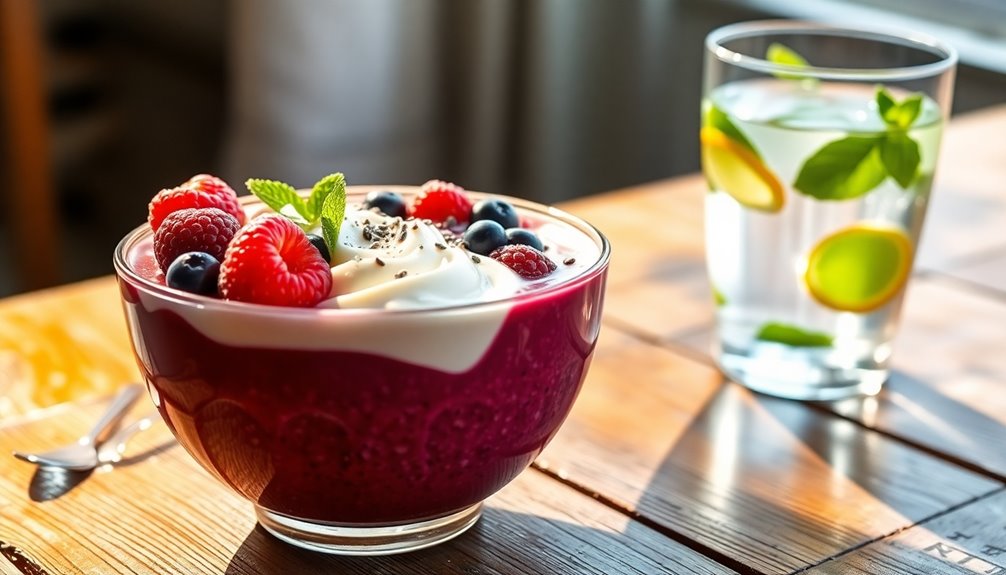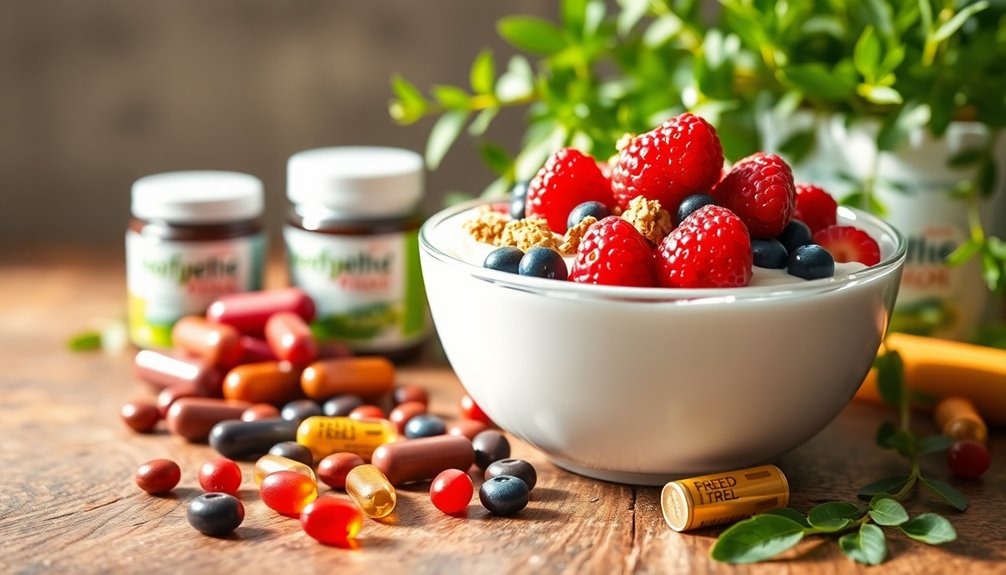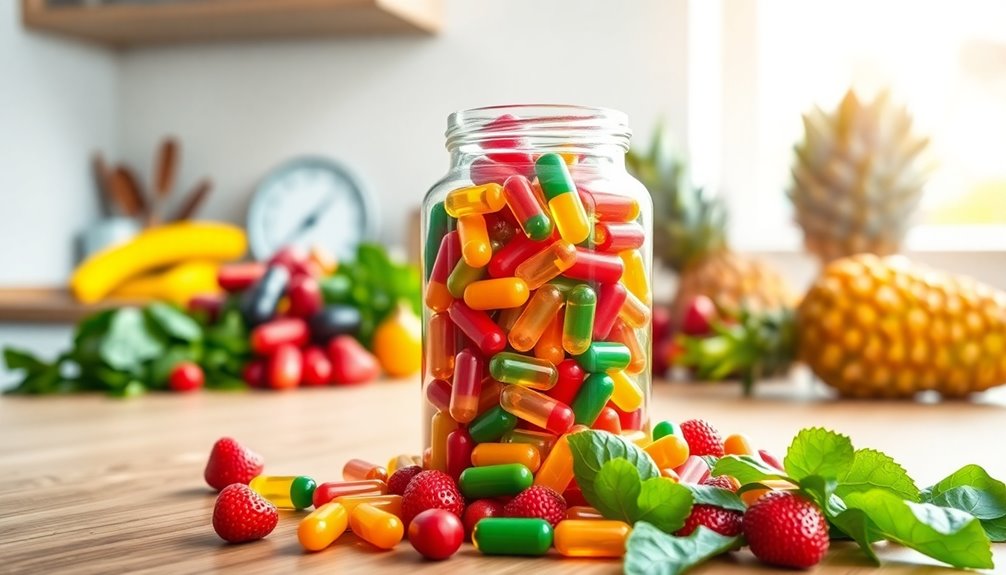Probiotics play a significant role in supporting your weight loss goals by enhancing gut health and improving metabolism. They balance gut bacteria, which can influence fat storage and insulin sensitivity. Certain strains, like Lactobacillus gasseri, have been shown to help with appetite control and modulate carbohydrate metabolism. By increasing the diversity of your gut microbiome, probiotics can aid in better nutrient absorption and energy regulation. Incorporating natural sources like yogurt, kefir, and fermented foods, or using tailored supplements can boost your efforts. There's much more to understand about optimizing your weight loss journey with probiotics.
Key Takeaways
- Probiotics improve gut health by balancing the microbiome, which is crucial for effective weight management.
- Certain probiotic strains, like Lactobacillus gasseri, can enhance fat metabolism and promote weight loss.
- A diverse gut microbiome, supported by probiotics, aids in nutrient absorption and energy regulation, supporting weight control.
- Incorporating fiber-rich foods alongside probiotics can optimize weight loss efforts and appetite regulation.
- High-quality probiotic supplements tailored to individual needs can enhance weight loss results when combined with a balanced diet and exercise.
Understanding Probiotics

When it comes to gut health, grasping probiotics is crucial for anyone interested in their overall well-being. Probiotics are live microorganisms, often referred to as "beneficial bacteria," that can offer a range of probiotic benefits. These advantageous organisms help maintain a healthy balance in your gut microbiome, which plays a pivotal role in digestion, immune function, and even mood regulation.
You might wonder how probiotics can impact your gut health specifically. Research shows that they can help prevent and alleviate digestive issues such as bloating, constipation, and diarrhea. By promoting a diverse gut microbiome, probiotics contribute to the breakdown of food, enhancing nutrient absorption. This balance is essential; when harmful bacteria outnumber the beneficial ones, it can lead to various health issues, including inflammation and weakened immunity.
Incorporating probiotics into your diet can be as simple as enjoying fermented foods like yogurt, kefir, sauerkraut, or kimchi. Additionally, you can find them in supplement form, which can be a convenient alternative. However, it's important to choose high-quality products to ensure you're receiving the right strains that align with your health goals.
Grasping the role of probiotics in gut health empowers you to make informed decisions about your diet and lifestyle. By embracing these beneficial bacteria, you're not only nurturing your gut but also fostering a sense of belonging to a community that values health and wellness.
How Probiotics Affect Metabolism

Probiotics play a significant role in influencing your metabolism, which can ultimately affect your weight management efforts. By balancing your gut microbiome, probiotics can enhance insulin sensitivity and impact how your body stores fat. When your insulin sensitivity improves, your body becomes more efficient at using glucose for energy, rather than storing it as fat. This means that incorporating probiotics into your diet may help you make strides towards your weight loss goals.
Here's a quick overview of how probiotics can influence these metabolic processes:
| Aspect | Impact |
|---|---|
| Probiotics and Insulin Sensitivity | Enhance the body's ability to use insulin effectively, reducing fat storage. |
| Probiotics and Fat Storage | Help regulate fat storage by balancing gut bacteria, which can influence metabolic processes. |
| Overall Metabolic Rate | May increase the overall metabolic rate by promoting healthy digestion and nutrient absorption. |
| Weight Management | Support sustainable weight management through improved gut health and metabolic function. |
Research suggests that specific strains of probiotics can help modulate the way your body metabolizes fats and carbohydrates. By fostering a healthy gut environment, you can create a solid foundation for your weight loss journey. Remember, every small step counts, and incorporating probiotics into your routine could be a game changer in how you approach your overall health and well-being.
Probiotics and Appetite Control

Understanding the connection between gut health and appetite control can be essential for your weight loss journey. Research indicates that the balance of bacteria in your gut plays a significant role in regulating your cravings and overall appetite. Probiotics, which are beneficial bacteria, can help maintain this balance and positively influence your hunger signals.
When you consume probiotics, they can enhance the gut-brain connection—a complex communication network between your digestive system and your brain. This connection is vital because it affects your feelings of satiety and hunger. Certain strains of probiotics have been shown to help reduce cravings, making it easier for you to stick to your weight loss goals.
For instance, some studies suggest that specific probiotics may help decrease levels of ghrelin, the hormone responsible for stimulating appetite.
You might find that incorporating probiotics into your diet can lead to improved mood and reduced stress, further influencing your eating habits. When you feel balanced emotionally, you're less likely to turn to food for comfort, which can help curb those unwanted cravings.
As you explore the role of probiotics in appetite control, remember that consistency is key. You can find probiotics in foods like yogurt, kefir, and fermented vegetables, or consider a high-quality supplement. By nurturing your gut health, you're not just supporting digestion; you're also taking a proactive step toward managing your appetite and achieving your weight loss goals.
Gut Microbiome and Weight Management

The gut microbiome greatly impacts weight management by influencing various metabolic processes and energy regulation. Your gut is home to billions of microorganisms that play an essential role in how your body processes food and stores energy. When your microbiome diversity is high, it enhances your gut health, making it easier for you to maintain a healthy weight.
A diverse microbiome can help break down complex carbohydrates and absorb nutrients more effectively, which can support your weight loss efforts. Research shows that individuals with a more diverse gut microbiome tend to have healthier body weights compared to those with less diversity. This diversity helps regulate hormones involved in appetite control and fat storage, contributing to effective weight management strategies.
When you nurture your gut health, you're not just helping your digestive system; you're also setting the stage for better weight regulation. Incorporating probiotics into your diet can enhance microbiome diversity and promote gut health. These beneficial bacteria can help balance the gut ecosystem, potentially leading to improved metabolic functions and better energy utilization.
It's important to remember that everyone's microbiome is unique, so what works for one person may not work for another. However, focusing on a diet rich in fiber, fermented foods, and probiotics can support your gut health and weight management journey. By prioritizing your gut microbiome, you're taking a significant step toward achieving your weight loss goals and fostering a sense of belonging in a community that values health and wellness.
Sources of Probiotics

Many people often overlook the variety of sources available for probiotics, which are essential for maintaining gut health. Incorporating probiotics into your daily routine can be achieved through both fermented foods and probiotic supplements. Each source offers unique benefits that can help you on your weight loss journey.
Fermented foods are among the richest natural sources of probiotics. Options like yogurt, kefir, sauerkraut, kimchi, and miso aren't only delicious but also packed with beneficial bacteria. These foods undergo a fermentation process that cultivates live cultures, contributing to a healthy gut microbiome. When you include these foods in your diet, you're not just enhancing flavor; you're also promoting your overall well-being.
On the other hand, probiotic supplements are a convenient alternative for those who may not enjoy fermented foods or want to make sure they're reaching their daily probiotic goals. Available in various forms—capsules, powders, and drinks—these supplements can provide a specific strain of beneficial bacteria tailored to your needs. When choosing a supplement, look for one that lists the strains and CFUs (colony-forming units) to confirm you're getting an effective product.
Whether you prefer the natural approach of fermented foods or the convenience of probiotic supplements, you can find a source that fits your lifestyle. Prioritizing these options can assist you in maintaining a balanced gut microbiome, supporting your weight loss and overall health goals.
Incorporating Probiotics Into Your Diet

Incorporating probiotics into your diet can be a simple and enjoyable process that greatly benefits your gut health and weight loss efforts. By focusing on meal planning and integrating both natural sources of probiotics and probiotic supplements, you can create a balanced diet that supports your goals.
Start your day with breakfast options like yogurt or kefir. They're rich in beneficial bacteria and can be easily added to smoothies or topped with fruits. For lunch, consider adding fermented vegetables like kimchi or sauerkraut to salads or sandwiches. These not only enhance flavor but also provide a probiotic boost. Dinner can feature miso soup or tempeh, both excellent choices for a gut-friendly meal.
Here's a quick guide to help you visualize your options:
| Meal | Probiotic Food | Probiotic Supplement |
|---|---|---|
| Breakfast | Yogurt | Probiotic capsules |
| Lunch | Sauerkraut | Probiotic drinks |
| Dinner | Miso soup | Probiotic gummies |
Don't forget about snacks! Incorporating probiotic-rich snacks like kefir smoothies or probiotic bars can help maintain your gut health throughout the day.
When choosing probiotic supplements, look for products with diverse strains and high CFU counts to guarantee effectiveness. You can also consult a healthcare professional for personalized advice. By integrating these foods and supplements into your meal planning, you'll be well on your way to enhancing your gut health while supporting your weight loss journey.
Research on Probiotics and Weight Loss

Current research suggests a promising connection between probiotics and weight loss, as studies indicate that these beneficial bacteria may impact factors like appetite control and fat metabolism. Different probiotic strains, such as Lactobacillus gasseri and Bifidobacterium lactis, have been highlighted in clinical trials for their possible effects on weight control. These strains are believed to assist in balancing gut microbiota, which can have a significant influence on how your body processes food and stores fat.
In a significant clinical trial, participants who consumed specific probiotic strains saw a decrease in body weight and waist circumference compared to those who did not. This indicates that including certain probiotics in your diet could help with your weight loss objectives. However, it's crucial to acknowledge that outcomes may vary depending on individual factors like diet, lifestyle, and overall health.
Additionally, while some studies demonstrate encouraging results, others suggest minimal impacts. This variation underscores the necessity for more comprehensive research to fully comprehend the underlying mechanisms. It's also important to note that probiotics aren't a quick fix; they're most effective when paired with a well-rounded diet and regular physical activity.
While exploring the potential advantages of probiotics for weight loss, remember to select high-quality supplements or foods containing potent probiotic strains. Participating in community conversations and exchanging experiences can also provide support and encouragement during your weight loss journey.
Frequently Asked Questions
Can Probiotics Cause Weight Gain Instead of Loss?
Yes, some probiotic strains can potentially cause weight gain rather than loss. Individual responses to probiotics can vary, leading to weight fluctuations in some people. Factors like gut microbiome composition and diet play a significant role in this outcome.
While many associate probiotics with weight loss, it's crucial to acknowledge that not all strains will yield the same results. Always consult a healthcare professional before making significant changes to your diet or supplementation.
Are There Any Side Effects of Taking Probiotics?
Studies show that about 30% of individuals encounter mild side effects from probiotics, such as digestive problems like gas or bloating. While most probiotics support gut health, they can sometimes result in discomfort as your body adapts.
Paying attention to your body and seeking guidance from a healthcare professional if side effects persist is crucial. By staying informed, you can make optimal decisions for your well-being and discover the probiotic that suits your requirements.
How Long Does It Take to See Weight Loss Results With Probiotics?
When you start taking probiotics, your weight loss timeline can vary. It generally takes a few weeks of consistent use to notice changes. Factors like diet, exercise, and individual metabolism play a significant role.
If you're consistent with your probiotic intake, you might start seeing results within four to six weeks. Remember, combining probiotics with a balanced diet and regular exercise can enhance your overall results and support your weight loss journey.
Can Children Take Probiotics for Weight Management?
Can kids take probiotics for weight management?
You might think probiotics for kids could be the magic solution to effortless weight loss, but it's not that straightforward. While some studies suggest probiotics might aid in weight management, they shouldn't substitute a balanced diet and exercise.
Consulting a pediatrician before introducing them for weight loss support is crucial. Their expert advice guarantees that any approach is safe and customized to your child's specific requirements.
Are All Probiotics Equally Effective for Weight Loss?
Not all probiotics are equally effective for weight loss. It really depends on strain selection and dosage recommendations. Different strains can have varying impacts on your gut health and metabolism.
To see results, you'll want to choose a probiotic with research backing its effectiveness in weight management. And remember, following the dosage recommendations is key to reaping potential benefits.
Always consult a healthcare professional for personalized advice tailored to your needs.
Conclusion
Incorporating probiotics into your diet can play a significant role in achieving your weight loss goals. Studies show that individuals using probiotics lost an average of 3-4% more weight than those who didn't. This highlights the potential of these beneficial bacteria in regulating metabolism and appetite. By supporting a healthy gut microbiome, probiotics can enhance your weight management efforts. So, consider adding probiotic-rich foods or supplements to your routine for a holistic approach to weight loss.



